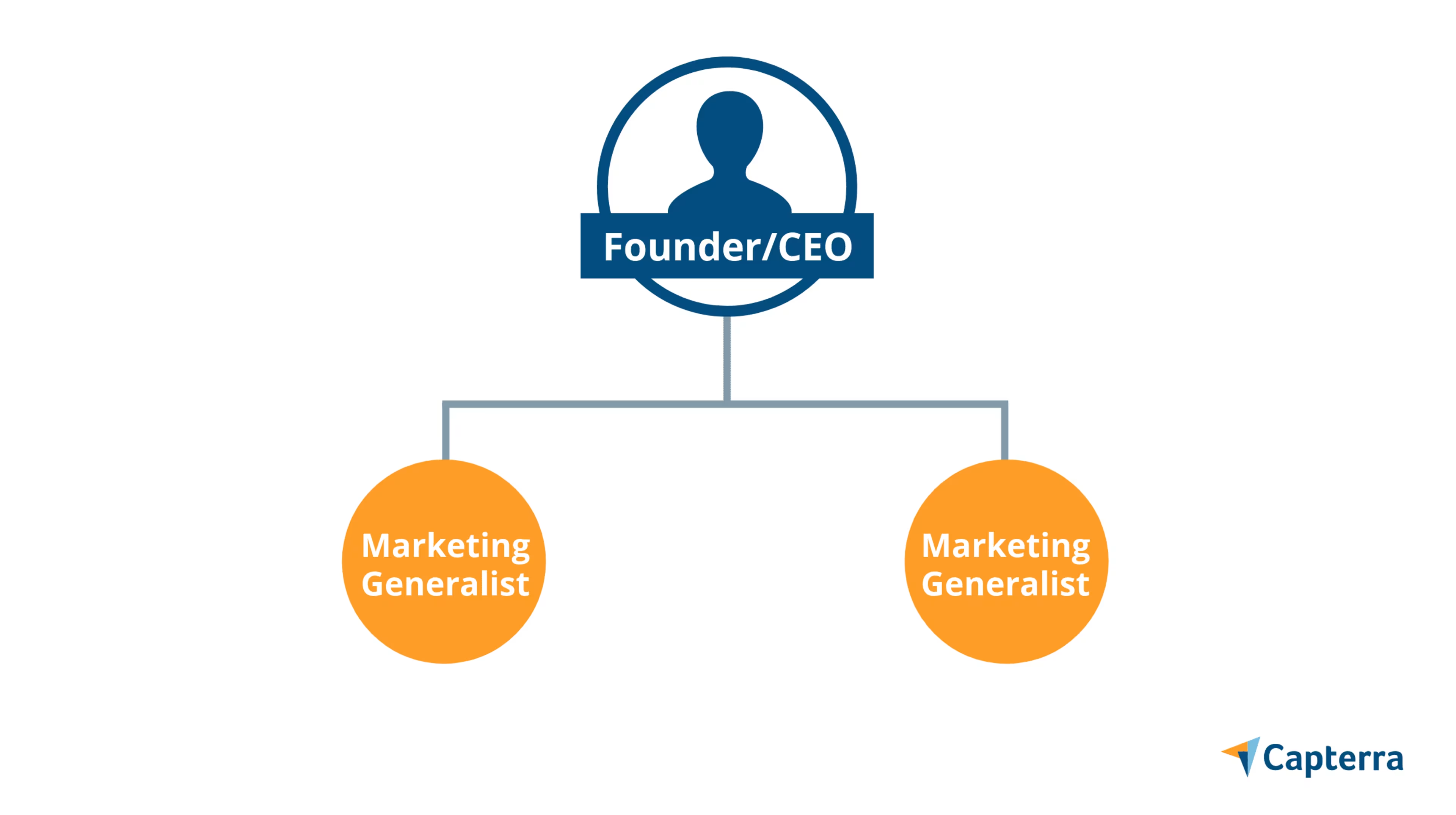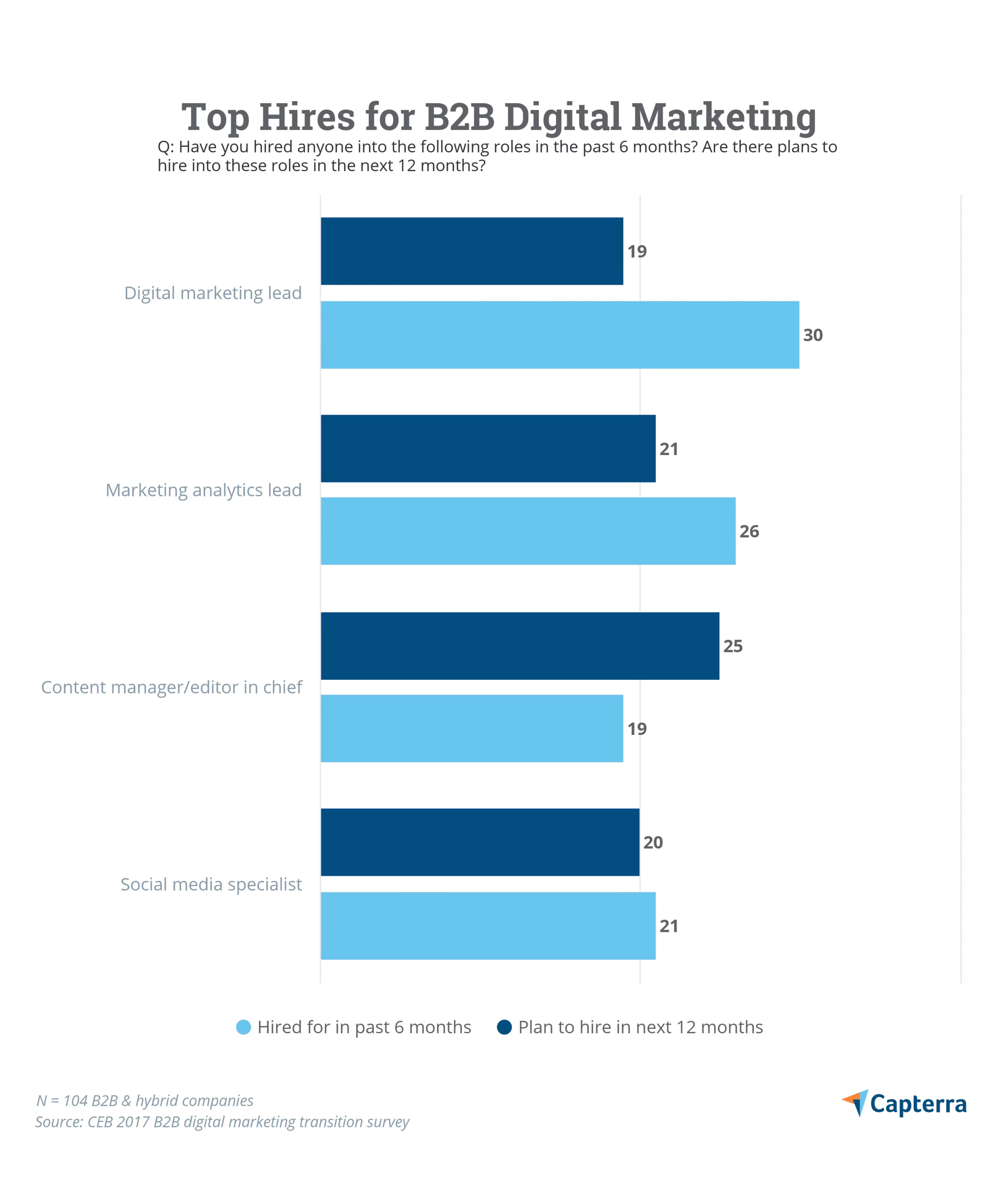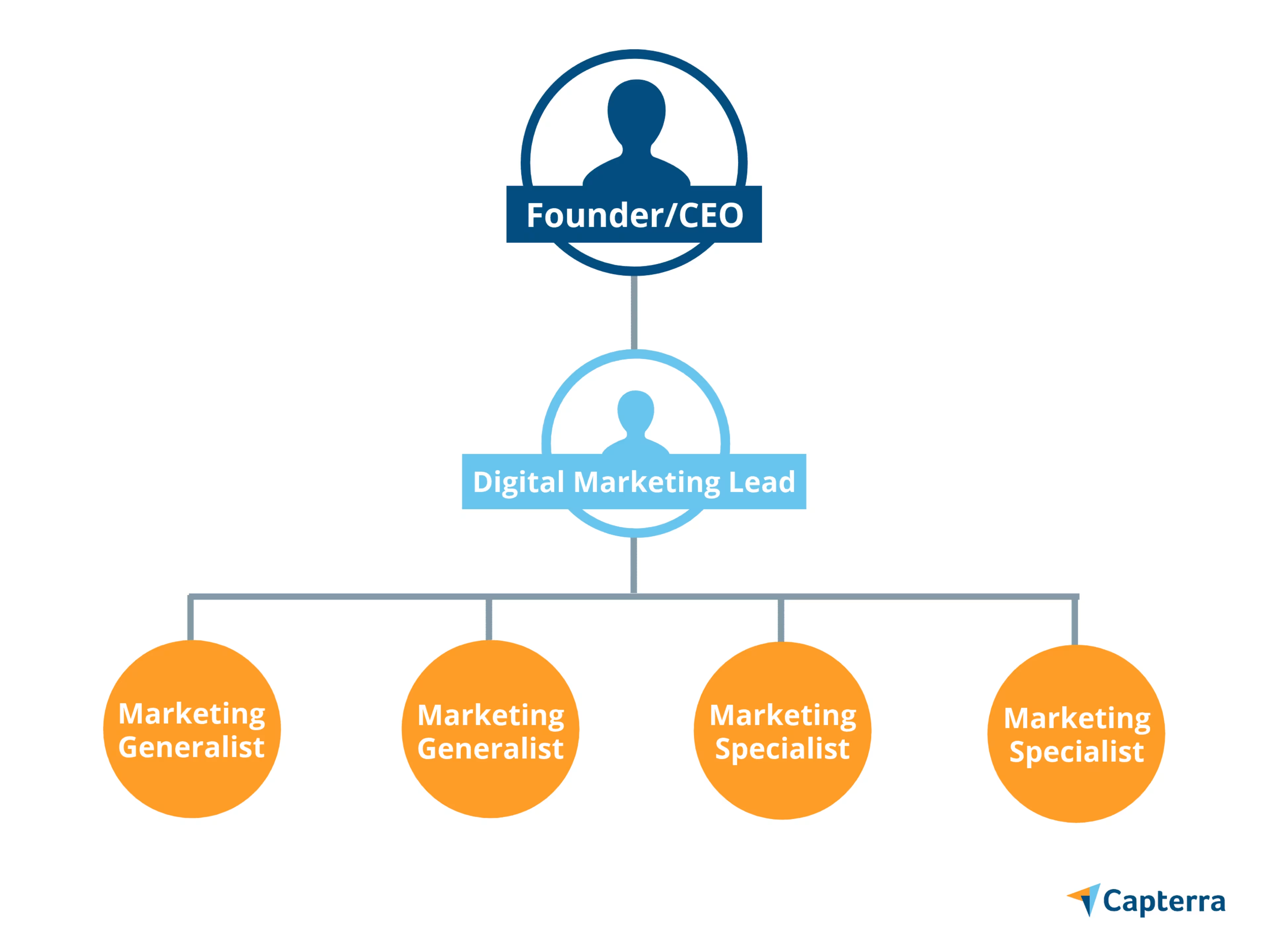Whether your small business has three employees or 30, the hierarchical structure of your business (also called your org chart) can make or break your productivity and growth potential.
Think of your company's org chart as its skeletal system. It holds the rest of the body in place, hidden beneath the other working parts but pivotal to determining how the body grows.
Just like your body's dependence on a healthy skeleton, your company needs a healthy, carefully structured org chart as it grows.
An org chart helps assess and distribute employee workloads and enhances coordination within an organization, especially when your small business depends on employees taking on cross-functional responsibilities.

Let's look specifically at growing a healthy org chart for your marketing department.
A 2017 CEB, now Gartner, report, "Top Hires for B2B Digital Marketing," found that B2B marketing organizations looking to hire new team members are most often looking to fill the roles of digital marketing lead, marketing analytics lead, content manager/editor-in-chief, and social media specialist. (Research available to Gartner clients.)
Are these the roles you should be looking to add to your small business's marketing org chart? Or should you hire one or two marketing generalists to cover those specialized responsibilities?
In this article, we will map out the differences between hiring a marketing generalist and a marketing specialist to help you decide which is the best fit for your small business marketing goals.
When should you hire a marketing generalist?

If you're a small business founder or CEO looking to build a marketing team of one to five people, hire marketing generalists.
Hiring a generalist means you are covering a wide range of bases while expending a modest amount of resources. This is a great option if you're looking to build a marketing strategy from scratch, or if you've prepared a marketing plan and need a small team to implement your vision.
A marketing generalist's responsibilities could include:
Design campaigns and support a marketing automation system
Direct/manage social media efforts (LinkedIn, YouTube, Twitter, blogging)
Support email marketing and other promotional projects
Create content formatting, layout, and graphics
Provide other sales support and administrative duties as needed
A marketing generalist (or a small team of generalists) will report directly to the founder/CEO, working collaboratively to build a structurally sound system to address a diverse set of goals and objectives.
Expect your generalists to think big picture: With multiple marketing functions to address at once, even the best marketing generalist can devote only a portion of their time to each project.
Thought leadership and subject matter expertise require a tremendous amount of time and cultivation; setting this kind of expectation on your marketing generalists will quickly leave them spread too thin as your business grows.
If: Your marketing team is small (think one to five people)
Then: Hiring generalists is likely the best way to go
When should you hire a marketing specialist?
As a rule, specialist roles should be added into your company org chart only when your existing team of marketing generalists have identified a need and mapped out how the specialist role will address that need.
If you've worked with your marketing generalists to outline a new marketing strategy (e.g., producing original content, mining leads through data analytics), then hiring a specialist could ensure the strategy gets the attention it requires for success.
CEB, now Gartner, surveyed 104 B2B marketers on what roles they are hiring for to support digital marketing efforts. (Research available to Gartner clients.)
When asked to report on hiring activity in the past six months and anticipated hiring for the next 12 months, the four most commonly named roles were digital marketing lead, marketing analytics lead, content manager/editor in chief, and social media specialist.

This data provides an excellent road map for small businesses that plan to expand their org chart and include specialist positions. From this survey, we can see that the industry best practice is to prioritize hiring a digital marketing lead, then to fill key specialist roles to address analytics, content, and social media.
Each of these roles serves a different function within a small business. Let's look first at hiring a digital marketing lead, who will act as the go between for the CEO and the marketing team.

Digital marketing lead
A digital marketing lead answers directly to the company founder/CEO, designing and managing strategy and execution for digital marketing, fundraising, and engagement.
This role oversees the marketing generalists as well as any specialists, and their responsibilities could include:
Oversee strategy and marketing direction, including content marketing, digital advertising, organic search, paid search, social media, and website.
Liaise between CEO and marketing generalists and specialists, guiding the implementation of the company goals and vision.
Lead digital support efforts for other departments and encourage strong collaboration and teamwork to execute cross-departmental initiatives.
If: You are looking for a marketing team captain to unify marketing direction/strategy
Then: Hire (or promote) a digital marketing lead
Marketing analytics lead
A marketing analytics lead would, at the direction of the digital marketing lead, mine and analyze data, identifying key insights with supporting data for existing initiatives.
A marketing analytics lead's responsibilities could include:
Utilize marketing analytics software to provide direct marketing analytics and statistical modeling, campaign analysis, and CRM.
Provide analytic insight to business development, customer relationship management. and marketing programs.
Utilize data-driven recommendations to support growth in customer insights management, digital insights, and loyalty program performance.
If: You want to leverage data to grow your marketing reach
Then: Hire a marketing analytics lead
Content manager/editor-in-chief
A content manager/editor-in-chief would, at the direction of the digital marketing lead, coordinate content production and publishing through various marketing channels. This role would be heavily engaged in management and measurement of digital content for search engine optimization (SEO) and social media.
A content manager/editor-in-chief's responsibilities could include:
Utilize data-driven recommendations to support growth in customer insights management, as well as the pursuit of new actual or target markets.
Network with and organize freelance content writers and full-time content writers to promote thought leadership, brand authority, and expertise.
Oversee the leveraging of content throughout the organization.
Ensure that all marketing assets are consistent with overall business objectives and reflect the company's style and voice.
If: You want to produce leading content and expand into new target markets
Then: Hire a content manager/editor-in-chief
Social media specialist
A social media specialist would, at the direction of the digital marketing lead, manage the curation, coordination, and moderation of all of the company's social media activity.
A social media specialist's responsibilities could include:
Manage and post branded content and monitor platform analytics across all social platforms (e.g., Facebook, Twitter, Pinterest, Instagram, LinkedIn and YouTube).
Develop, create, and execute innovative social media campaigns while driving best-in-class customer experiences and engagement.
Coordinate content writing and publishing schedules and leverage e-blast platforms/applications.
If: You want to expand the reach of your social media platforms
Then: Hire a social media specialist
Ready to start building your marketing team?
Most people at small businesses have to wear many hats, and small marketing teams should hire marketing generalists as they are better equipped to handle a variety of different tasks within the marketing organization.
When your marketing department is ready to target new markets, analyze more data, or cultivate more touch points, then it's time to consider bringing on a specialist. A good org chart enables effective resource management and makes it easier to monitor performance and growth across the organization. It is the strong, steadfast skeleton your small business requires as it grows in size and reach.
As you design a marketing org chart for your small business, consider what you want the team to accomplish and how you envision those tasks distributed. Starting out, build your marketing team around marketing generalists. If your team of generalists identify specific strategies for growth marketing beyond the purview of their role, then it may be time to bring in a specialist.
Thinking about outsourcing a digital marketing agency for your business needs? Browse our list of top digital marketing agencies and learn more about their services in Capterra’s hiring guide.
For further reading: